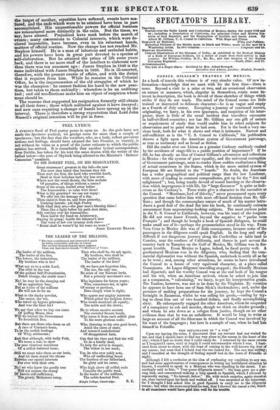PEEL LYRICS.
A CURIOUS flood of Peel poetry pours in upon us. As the gods have not made the Spectator poetical, we grudge room for more than a couple of specimens; but the fact that the versifiers, who, as a body, reflect prevalent notions and feelings, should have adopted the late Premier, so warmly, is not without its value as a proof of the juster estimate to which the public opinion has arrived. It is remarkable that another lyrical correspondent, from Dublin, has taken for his text the same drama with the writer of the ballad below—the part of Shylock being allotted to the Minister's Hebrew Caucasian " assailant.
TU SIR ROBERT PEEL, ON HIS RESIGNATION.
Great statesman! greatest in thy fall—for now The crew that hated thee because they felt Thou wert the first, the herd who erewhile knelt, Shall in their helmless bark thy loss avow. Where now the venal shouts, the false acclaim Of parasites, of things without a name? Scum of the ocean, hurled away before The Inaccessible: so calm wert thou!
What is thy guerdon? we can not repay: We offer but the homage of a day. Thou claim'st from us, and from posterity, Undying laurels: yet high Poetry Tells what they are,—the poor man's blessing thine I Thou like s light before his path dost shine, Sole watcher over his humanities •
Thou laid'st thy hand on Aristocracy,
Staying its grasp; beside the labourer's door Thy voice of law o'er tyranny doth rise- " Bread shall be water'd by his tears no more 1 "
JOHN EDMUND READE.
THE LEADER OF THE MILLIONS.
" The best-conditioned and unwearied spirit
In doing courtesies, and one In whom The ancient Roman honour more appears
Than any that draws breathferchant of Vence.
Lite leader of the millions, The leader of the free, The honest, the industrious, My brothers who is he?
What say ye to a noble Lord, The rider in the van Of the gallant Self-Protectionists, Dutch George, the stable man?
No! he may be the slanging cad Of an opposition 'bus • But as leader of the millions He will not do for us.
What to the flashy novelist, The orator, the wit, Who raked up bygone grievances, And was the biter bit?
We say that when we buy our coats Of puffing Moses, then
Will we intrust the Government
To Israelitish Ben.
But there are those who deem us all A race of Cantian's brats, To be the serfish heritage
Of Whig aristocrats; And that although, with bully Polk, - We rouse a war, to show The poor vicarious manliness Of a selfish battered beau;
.Still we must take them as our lords, And let them round the throne Entwine our sacred interests For ever with their own.
Not we who knew the goodly tree Will not endure the stump Of barren self-sufficiency, The greedy Melbourne rump.
Then who shall be, we ask again,
My brothers, who shall be The leader of the-millions,
The leader of the free?
Oh we have not forgotten him, The one, the only one, No scion of our Norman lords, But a princely merchant's son; Who legislates for future years; Who, conscience-led, in spite Of enemy or partisan, Does simply what is right;
Who spares not mighty interests
Which grind the helpless down; Who treats mankind all equally, The noble and the clown; He to whose suasive accents The crowded Senate bends, Who turns it from each selfish plan To his more glorious ends; Who, listening to his own good heart, Amid the cares of state, And venom'd maledictions Of disappointed hate, Can find the time and find the will To do a kindly deed, To help the artist in despair, The widow in her need; Yes, he who ever nobly acts, Who all unflinching bears The burdens of our fatherland, Its glory and its cares; Who high above all selfish ends Consults the public weal, Is the leader of the millions, The noble-hearted PeeL
Ring's College, Cambridge. R. E.


























 Previous page
Previous page